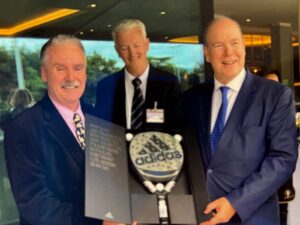
COMMUNITY SPOTLIGHT:
BARRY COFFEY
- Worldwide
- Jamie Rowe
Discovering Padel
Racquet sports have been a lifelong passion for Barry Coffey. In the mid-1980s, he was crowned Irish National Badminton Champion and represented his country at international level. By the age of 26 he stepped away from the sport to focus on business, but stayed active on the courts through tennis at Fitzwilliam LTC in Dublin. It was there, in the mid-1990s, that he first heard about padel.
A fellow club member had returned from Argentina with photographs of a “strange-looking court” – then built with concrete walls rather than the glass walls we know today – and predicted that this game would one day be huge.
Two decades later, in 2015, Barry saw that prediction come true. Living in France, he spotted a photo of a padel court in his local newspaper and arranged a lesson. His coach was Kristina Clement, a World Championship medallist. “After just a few minutes on court I knew there was something very special about this sport and that I was hooked,” he recalls. Ten years later, Kristina is still his coach, motivator, and now a good friend. “Without a doubt she is the person who has had the most influence on my padel career,” Barry told us.
From Senior Competition to UK Number 1
At that time, few events existed for senior players. In 2016 Barry joined the British Padel Tour, a circuit across England, Scotland, and Northern Ireland. By 2017, an Over 45s category was added, and despite the heavy travel commitments, he entered all the tournaments. In March 2018, at age 58, he became the No.1 ranked player on the tour – a position he held for around 18 months!
This achievement brought him into the adidas family, a relationship that continues to this day. Within his club he became affectionately known as “Monsieur Adidas,” but after turning 60, the nickname evolved. Someone at the club dubbed him their “Adidaddy” – a name later approved by adidas (All For Padel) and proudly printed on his shirts.
Creating the Six Nations Masters
Barry also wanted to give something back to the sport. In 2017, while competing in Scotland, he floated the idea of a multi-nation veterans’ team competition. With support from players and sponsorship from Paul Ross of PadelTech Ltd, the event was born, and it later became known as the Six Nations Masters Padel Tournament.
The inaugural edition was held at Casa Padel in Paris, where teams from England, Ireland, Monaco, and Scotland competed. “Most of the players were wide-eyed with wonder when they walked in and saw twelve indoor courts laid out before them,” Barry remembers, as large padel clubs were not commonplace back then. Since then the tournament has travelled to Sweden, Finland, Spain, Switzerland, and Germany, with Estonia set to host in 2026, as defending champions.
One of Barry’s proudest memories is not a personal victory but watching players arrive at Casa Padel for that first edition – each having paid their own way, each full of excitement – and knowing he had made the event possible.
“If you are looking to put something back into our sport, think about running a tournament, perhaps with a special theme, not for profit, just for padel,” he advises.
Competing on the International Stage
After COVID halted competitions in 2020, Barry reset his focus. Rather than return to the British tour, he partnered with Argentinian player Roque Roasio on the International Senior Padel Tour (ISPT). Together they have secured titles in Switzerland, Sardinia, and Dubai. Playing alongside such an experienced partner has been a valuable education in patience and self-belief, and the duo plan to continue competing together.
Looking Ahead for Padel in Ireland
On a global scale, Barry sees a bright future for padel, including possible Olympic inclusion one day. But his immediate focus, as President of the Irish Padel Association, is to establish a formally recognised National Governing Body for padel in Ireland.
That vision means working closely with Tennis Ireland. “Some people say that having padel governed by tennis is a bad idea,” Barry acknowledges, “but it has proved to be extremely successful for the growth of padel in several countries such as France (FFT), Italy (FIT), and, of course, our nearest neighbours Great Britain (LTA). So why not Ireland?” Encouragingly, the approach has broad support from players (club and national team level), private clubs, and commercial operators alike.
For Barry, padel has been a journey of competition, community, and contribution – from his first steps on court in France, to multiple tournament victories across the globe, to building international tournaments, and now steering the sport forward in Ireland while still playing internationally. His story reflects the passion and dedication that drive padel’s growth across the world.
It was a pleasure talking with Barry, and I’d like to thank him again for sharing his story with us – much appreciated! We hope his story inspires others within padel and wish him all the best.
